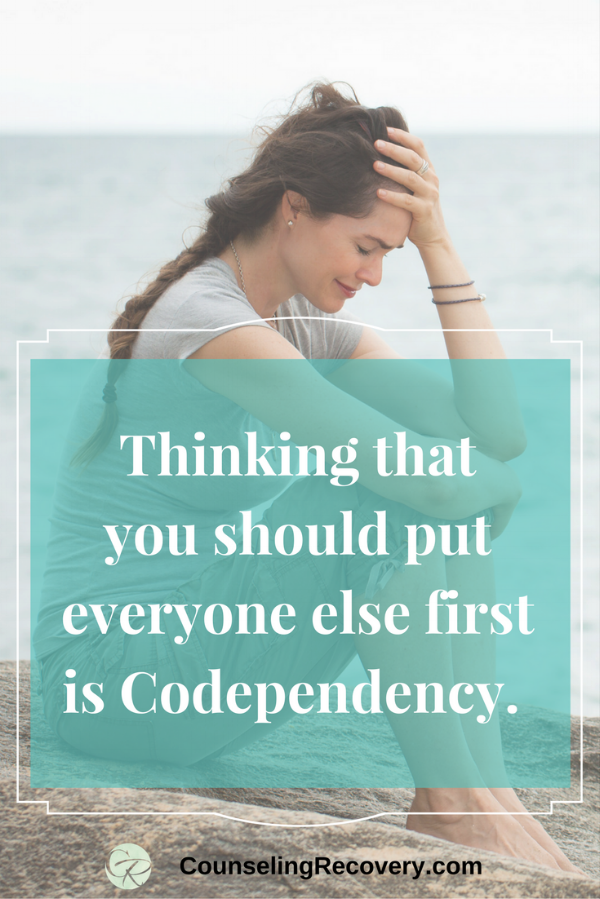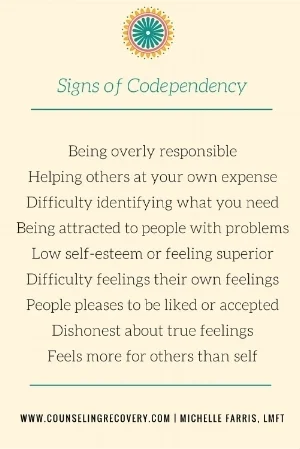Are You Codependent?
Codependency is a complex issue, like a tree with many branches. Though there are several definitions out there, here’s a simple version. Codependency happens when you lose yourself by focusing on others at your own expense. Seeking approval becomes more important than self-care.
Codependency develops in childhood as a response to caregivers being unavailable or inconsistent. It's common in families with addiction, but also found when there is mental illness, depression, trauma, rage and child abuse.
While the alcoholic is obsessed with the substance, the codependent is obsessed with the alcoholic. But you can struggle with codependency even when there's no addiction.
It's a dysfunctional relationship pattern of control, unrealistic expectations and excessively helping others.
Here are some traits to consider if you think you may be codependent.
What are the signs of Codependency?
Focusing primarily on another person's needs or behaviors
Getting into relationships with addicts, alcoholics, or people with lots of problems
Difficulty knowing or asking for what you need
Being too generous and giving at your own expense
Low self-esteem or feeling superior (or right)
Hiding true feelings in order to keep the peace
Difficulty communicating directly especially if someone is upset
People pleasing becomes more important than self care
A pattern of unexpressed anger that triggers resentment and feeling like a victim
Negative Assumptions Codependents Make
People who struggle with codependency often make negative assumptions in their relationships. These assumptions trace back to childhood where you learned that your needs weren't important. You learn to focus on being the good girl, or the over-achiever.
You seek approval in others because you don’t know how to give it to yourself. These behaviors start in childhood but cause problems in adult relationships.
Assumptions like...
"If I say no, you'll get mad at me."
"I have to be what you want me to be to be loved."
"If you're upset, it must be my fault."
"I can't ask for what I want because that means I'm selfish."
"It's more important for me to please you rather than take care of myself."
Starting the Codependency Recovery Process
Recovering from codependency takes time and lots of practice! The first step is becoming aware of what behaviors are hurting you and your relationships.
Codependency affects several different areas like self-care, boundaries, how you pick partners, self-esteem, and communication styles but there are many more. Because so many areas are affected, recovery takes time and plenty of support.
Initial Goals in Codependency Recovery
Here are some areas to focus on in recovery.
Identify relationship patterns. Do the same things frustrate you in relationships?
Begin to set boundaries and say no when needed.
Focus on self-care by getting enough sleep, eating well, exercising, avoid over committing.
Communicate directly by using "I" statements instead of avoiding conflict.
Let yourself feel your feelings. Hiding how you feel creates resentment.
Examine old beliefs of putting yourself last that need to change.
Consider attending Al-Anon for support.
Benefits of Codependency
Signs of codependency
You have a huge heart but that's not the problem. Excessively helping others is a sign of codependency but when done in moderation it's considered a strength.
The desire to please others is the hallmark of codependency. Click here to read about The Benefits of Codependency. It's giving at your own expense that causes suffering.
Final thoughts on codependency
The goal of codependency recovery is finding the balance between caring for others and taking care of you. Redirect the focus to participating in your own life.
Pay attention to what you need first before responding to what others need. This requires challenging that old beliefs that says you have to put others first.
Change takes time but pain is the greatest motivator. When you find yourself struggling with depression, anxiety or feeling sick from worrying, it's time to get help. It's okay to take steps towards changing these patterns. You just need the right tools and support.
I always recommend Al-Anon, a 12 step program that provides free group support. Here you'll learn how to heal childhood pains that create unhealthy relationship patterns. One day at a time you can recover and even thrive whether the alcoholic is still drinking or not.
For more information read How to Start Recovering from Codependent Relationships.



